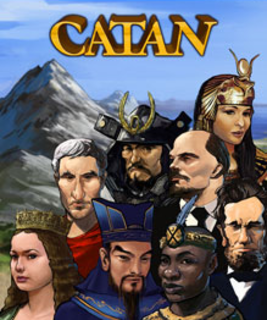Catan’s solid, strategic gameplay is presented well, but its somewhat slow pace might put some people off.
In addition to collecting resources and building things yourself, there are many ways to help yourself and hinder your opponents. The most notable are development cards, which are built in the same way as settlements and roads. You’re given a random card that will benefit you or frustrate your opponents. Examples of these include a free victory point, and the solider, which allows you to steal a resource card from one player. You can trade resource cards with your opponents if you’re in need of a particularly scarce resource, or if you have an abundance of one particular card, you can use the port trader service to swap four of one resource card for one of another.
Catan’s core gameplay is simplistic, but there is plenty of room for strategising. The board is arranged differently each time you play, and certain grid tiles have a higher chance of being rolled (more dots on a tile signal the higher chance it will be rolled). Each game plays out differently because of this. A road building strategy might be suited to a map with an abundance of brick and lumber, whereas a development card strategy would work better in other situations. The tactical nature of the game and trying to be one step ahead is the most compelling thing about Catan, but it still manages to be accommodating to beginners. There is a “play as you learn” mode, guiding you through all aspects of gameplay, which does a great job of familiarising you with the game.
The audiovisuals are a minor part of the game, but they are of an acceptable standard. The game allows you to choose from the classic board game skin and a 3D “living world” skin; it’s nice as it brings the wheat fields and the ore mines to life, but it can be difficult to see where roads and settlements are. The classic skin is no frills, but you can easily distinguish where everything is. Calming melodies play in the background; these are relaxing and fit the game well, but how much you enjoy them really depends upon your taste in music.
The online portion of the game holds up well and greatly extends Catan’s value. Playing against the AI is okay, but it’s even better to try and outwit three other human players. Ranked matches have a fixed rule set, but player matches allow you to change a few settings such as the turn time limit, score required to win, etc. A headset makes it easier to communicate when trading with other players, but the “emotes” allow you to get by fine without a headset. These fun little animations allow you to express anger if the dice isn’t on your side, tell traders to sweeten the deal, and tell people to hurry up!
Catan has the standard Xbox Live Arcade leaderboard format, which allows you to compare your win-loss record with friends and the world. It also features a good set of achievements that will allow new players to pick up points, but reward those who commit more time to the game. These include freebies like building your first settlement and inviting someone to an online match, and collecting five-hundred victory points in ranked matches which requires more dedication.
Catan has managed to introduce the classic board game to a large new audience, and it doesn’t do much wrong. The heart of the game is retained impressively, whilst adding new features such as online play. If you don’t like games that can be slowed-paced, Catan isn’t for you, but if you like thinking and strategising in your games, Catan is well worth looking at.

